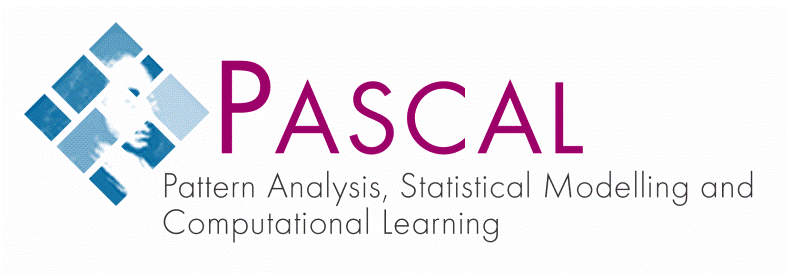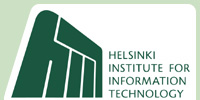


Näitä sivuja ei päivitetä enää. Ole hyvä ja katso tietojenkäsittelytieteen laitoksen WWW-sivuja: http://ics.tkk.fi/fi/studies/.
These pages are not any more updated. Please, see web pages of Department of Information and Computer Science (ICS): http://ics.tkk.fi/en/studies/.
| Lecturers | Prof. Sami Kaski, TKK; Prof. Tommi Jaakkola, MIT Tutorial to cell biology: Doc. Petri Auvinen, University of Helsinki |
|---|---|
| Assistant | Arto Klami, TKK |
| Credits (ECTS) | 5 |
| Course code | T-61.5110 (TKK) and 582620 (Univ. of Helsinki) |
| Location | Otaniemi (Espoo/Finland) (how to get there) |
| Time | 13.-17.8.2007 |
| Lectures | 10:30-12, 13-14:30, lecture hall T2 (Computer science building is number 30 on local map) |
| Exercises | 15-17, Maari-C (number 17 in the same map) |
| t615110@cis.hut.fi |
Register by sending email to t615110@cis.hut.fi. If you are a Hecse and/or PASCAL student, please tell that in the email.
The course attracted sufficiently many participants and will be arranged. You should receive a confirmation email about your registration; if not, please send email to the above address. The course has also reached the maximum number of participants (due to limited size of the exercise hall). You may still register, but unless you give very good reasons you are not that likely to fit in. The first priority is for PASCAL/Hecse students, and secondary priority for students majoring in Computer and information science (TKK) or Computer science (UH). The lecture hall is bigger, so it is possible to attend the lectures even if the course is otherwise full. If you want to attend just the lectures, please tell that when registering.
TKK students should additionally register in WebTopi, but that will not be needed before the actual course starts. Instructions will be added here when the registration for this course opens in WebTopi. Students from the Department of Computer Science (Univ Helsinki) should correspondingly register through the department registration system when it opens.
Note: The course has two organizing institutes, TKK and the Department of Computer Science at the University of Helsinki. Students from both can attend the course without any special arrangements (such as the JOO study right). The same holds for all PASCAL and Hecse students. If you are unsure about practicalities regarding the attendance, please tell that when registering.
Basic knowledge of probability, statistics, linear algebra, calculus; some experience on programming and algorithms; basics on cellular biology (or: read a crash course beforehand).
It is also a good idea to know something about graphical models beforehand. Below is a list of possible sources of information, and again the purpose is not to read everything but pick out some of the sources.
To pass the course you need to:
The course will be graded solely based on the project work, and the range of accepted grades is 1-5.
This course is about computational methods for solving key problems in cellular biology and medicine. In particular, we discuss how to understand and elucidate interacting sets of molecules that give rise to and regulate cellular processes, from basic metabolism to growth and diseases. The ability to infer such molecular processes from measurements requires a combination of advanced modeling tools and biological knowledge. The development of such tools, probabilistic graphical models in particular, is an active area of research.
Our goal in this course is to bring biological and medical research problems together with appropriate analysis tools and methods. The course starts from basics but will rapidly reach contemporary research questions. Ideally, students with stronger computational backgrounds will get deeper understanding of the core modeling strategies in this area and a sense of open modeling and biological questions, whereas students already familiar with biological problems will understand limitations of current modeling approaches, where they do and don't apply, and will learn to match problems with computational approaches.
The course is taught through interactive lectures that are based on lecture notes and recent papers. The students are expected to complete a class project and attend exercise sessions. The project can be done in groups, ideally with students from different disciplines.
We expect the course to be most useful for graduate-level (advanced Master's students), doctoral students in computer science, applied mathematics, statistics, bioinformatics, bioinformation technology as well as methodologically inclined students in biology and medicine.
| Monday | Petri Auvinen | tutorial to cell biology and measurement of cellular processes Slides part 1 and Slides part 2 (note that both files are quite large, around 20Mb) |
| Tuesday | Samuel Kaski | gene expression, analysis of differential expression, co-expression Lecture notes and Differential expression (by Jaakkola) Slides |
| Wednesday | Tommi Jaakkola | gene regulation, protein-DNA binding, expression programs Slides |
| Thursday | Samuel Kaski | protein-protein interaction networks Lecture notes and slides |
| Friday | Tommi Jaakkola | genetic regulatory networks Slides |
There is no registration fee but accommodation and food is on your own expense. PASCAL students may apply for a stipend in the conference and workshop attendance programme of PASCAL, and we may have limited travel support (send a brief letter about your background and motivation if you wish to apply).
You are at: CIS → T-61.5110 - Intensive course on modeling biological networks
Page maintained by t615110 (at) cis.hut.fi, last updated Tuesday, 19-Aug-2008 10:51:03 EEST